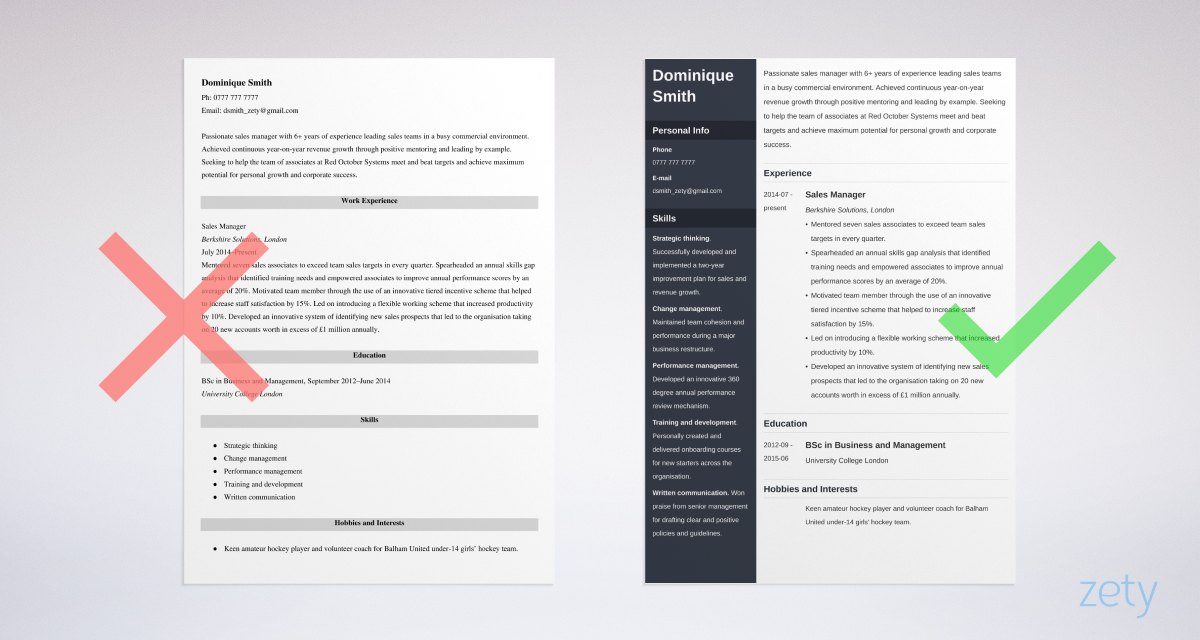10+ Leadership Skills Examples for Your Career & Resume
Create your CV nowWhether you’re taking your first steps up the career ladder or you’re an established workplace commander, good leadership skills are essential to build positive relationships and inspire success. Effective leadership skills cover a range of abilities and are highly sought after by employers.
This guide will:
- give you examples of the most important key leadership skills.
- discuss why they’re important and give you some tips on leadership skills training.
- show how to include them on your CV.
So take a seat and get ready to learn everything you need to know about taking command at work.
Want to save time and have your CV ready in 5 minutes? Try our CV builder. It’s fast and easy to use. Plus, you’ll get ready-made content to add with one click. See 20+ CV templates and create your CV here.
Sample CV made with our builder—See more CV examples here.
And when you’re ready to include leadership skills in your CV, here’s a great selection of templates to use.
- 10+ Ready to Use CV Templates for Word
- 10 of the Best CV Templates for Job-Hunting Success
- 12+ of the Best LaTeX CV Templates
- 15+ Editable CV Templates for Free Download
- 15+ Infographic CV Template Examples
- 18+ Blank CV Templates to Fill In and Download
- 18+ Creative CV Templates
- 18+ Easy to Use Simple and Basic CV Templates
- 18+ Modern CV Templates to Edit and Download Now
- 18+ Striking Visual CV Templates
- 20+ Free CV Templates to Download Now
- CV Design: 18 Brilliant Templates to Inspire You
Expert Curated Video Content
If you prefer watching, our Certified Professional CV Writer, Caio, will explain in detail how to write a CV for 16-year-olds!
Leadership Skills on a CV
Dominique Smith
Ph: 0777 777 7777
Email: dsmith_zety@gmail.com
Passionate sales manager with 6+ years of experience leading sales teams in a busy commercial environment. Achieved continuous year-on-year revenue growth through positive mentoring and leading by example. Seeking to help the team of associates at Red October Systems meet and beat targets and achieve maximum potential for personal growth and corporate success.
Work Experience
Sales Manager
Berkshire Solutions, London
July 2014–Present
- Mentored seven sales associates to exceed team sales targets in every quarter.
- Spearheaded an annual skills gap analysis that identified training needs and empowered associates to improve annual performance scores by an average of 20%.
- Motivated team member through the use of an innovative tiered incentive scheme that helped to increase staff satisfaction by 15%.
- Led on introducing a flexible working scheme that increased productivity by 10%.
- Developed an innovative system of identifying new sales prospects that led to the organisation taking on 20 new accounts worth in excess of £1 million annually.
Education
BSc in Business and Management, September 2012–June 2014
University College London
Skills
- Strategic thinking. Successfully developed and implemented a two-year improvement plan for sales and revenue growth.
- Change management. Maintained team cohesion and performance during a major business restructure.
- Performance management. Developed an innovative 360 degree annual performance review mechanism.
- Training and development. Personally created and delivered onboarding courses for new starters across the organisation.
- Written communication. Won praise from senior management for drafting clear and positive policies and guidelines.
Hobbies and Interests
- Keen amateur hockey player and volunteer coach for Balham United under-14 girls’ hockey team.
What Are Leadership Skills?
Leadership skills are the abilities that a person uses to organise and guide others to reach a shared objective. They can be applied in a variety of situations but the importance of leadership skills is particularly apparent in the workplace, where groups of individuals need to work together to reach the common goals of a company or organisation.
The majority of the most important key leadership skills are examples of soft skills, which are characterised by the way you work and interact with other people. And just like soft skills in general, leadership skills are considered essential in every job sector.
There are certain hard skills involved with specific leadership situations, too. But overall, this is a skill set defined by a combination of people skills, emotional skills, social skills, communication skills and personal character traits.
Now let’s take a look at some examples of the most important leadership skills and qualities.
Read more: Good Skills for a CV (List of Examples)
Examples of Good Leadership Skills
These are the top 10 most important leadership skills needed to make a great leader in the workplace.
1. Strategic Thinking
If there’s one thing that all successful organisations have in common, it’s leaders with highly developed strategic thinking skills. Strategic thinking relates to your ability to have a vision for the future and to take the steps required to achieve it. In the workplace this means having the skills to plan for maximising future opportunities and overcoming obstacles for an organisation or a team.
It refers to being able to create a vision for the future that engages others and is based on sound evidence. Therefore it overlaps with other important abilities such as communication skills and analytical skills. It can also be considered as the key dividing factor between being merely a manager and becoming a genuine leader. A manager organises and delegates, but a leader has the ability to lay out the framework for future success and growth.
2. Communication Skills
Communication skills are important for everyone and are widely considered to be right at the top of every hiring manager’s wish list of workplace skills. But leaders need to develop these skills even further to be able to function effectively in the workplace.
They need to have superb verbal communication skills, combining active listening with compassion, charisma and positive assertiveness. They need to be able to elicit information from others through effective questioning, make presentations and give constructive and useful feedback. Good leaders also need to know how to communicate in challenging situations. Their communication abilities need to be practised and multi-layered to ensure they can carry out their work effectively.
Their written communication skills need to be multifaceted too. Good leadership skills in this regard include the ability to write reports and presentations, produce formal responses to complaints and draft policy and procedure.
3. Change Management
Many of the greatest challenges and opportunities facing both organisations and individuals come in times of flux. Change management skills are a non-negotiable for effective leadership. They’re closely linked to strategic thinking skills as a large part of change management involves planning, guiding and embedding the changes required for creating a future vision. Good leadership skills include developing innovative concepts for change, implementing those changes and overcoming the natural human resistance to change.
4. People Management
One of the simplest ways of defining a leader is a person who is in control of a group of others. You can’t be a leader without people to lead so having the ability to manage them effectively is essential to leadership success. Effective leaders have the ability to manage others in one-on-one settings and in groups. And once again, this overlaps with other critical skills such as communication skills.
5. Trustworthiness
In the workplace, a leader needs to inspire trust. People need to feel comfortable raising concerns and questions with their leaders at work. And trust creates respect, which makes it easier for a leader to implement their strategic plans. So trustworthiness is without a doubt one of the most important of leadership skills and qualities.
6. Responsibility
Part of having good leadership skills is taking responsibility for the work produced by your team, bad or good. You need to be able to take responsibility and accept the blame when things don’t go according to plan. Excuse making and finger-pointing undermines respect and trustworthiness, which damages your effectiveness as a leader. So good leaders need to accept the blame and develop solutions to prevent similar mistakes happening in future.
7. Flexibility
Leaders need to be nimble enough to make changes. External influences may come into play and staff may give feedback about current ways of working that require changes to be made. Effective leadership skills include responding positively to appropriate feedback and being open to making necessary changes.
8. Delegation
Delegation is a critical leadership skill for a number of reasons. Leaders need to be able to focus on the bigger picture. They can’t do everything themselves so some tasks need to be delegated to subordinates. But it’s not just about distributing work. Part of delegation involves empowering others by having them work on tasks that help to improve their own skills and add to their portfolio of professional experience. Trusting others to carry out work without micromanaging them also engenders trust and respect and allows them to share in achieving objectives.
9. Empathy and Emotional Intelligence
True, many leaders don’t show empathy and emotional intelligence and fallback on a cold and dictatorial style. But it certainly isn’t the most effective way to lead. Empathy and emotional intelligence feed into skills that we’ve already discussed such as trustworthiness and effective communication. But empathising with those that follow you also enables you to identify areas for improvement and to effectively capitalise on their strengths. So ultimately it builds a stronger morale and team spirit and greater productivity for the organisation.
10. Creativity
A true leader needs to be able to develop novel solutions and approach challenges from a different perspective. Being able to think outside the box drives innovation and allows previously unsolvable problems to be overcome. This in turn inspires others to do the same and instils confidence and respect.
When making a CV in our builder, drag & drop bullet points, skills, and auto-fill the boring stuff. Spell check? Check. Start building your CV here.
When you’re done, Zety’s CV builder will score your CV and tell you exactly how to make it better.
Top 10 Ways to Improve Your Leadership Skills
It’s true that many great leaders don’t have formal training. Additionally, the soft skills that make up the bulk of leadership skills are generally considered to be more difficult to teach than hard skills.
But many experts agree that leadership can and should be taught through formal training and education. And thankfully, there’s a wealth of options available. Here’s how to improve your leadership skills through structured learning and through your actions at work.
1. Check What Training Opportunities Your Employer Offers
Look for courses on communication, strategic thinking, assertiveness, change management and any of the other key leadership skills we’ve already discussed.
2. Research Specialist Leadership Skills Training
If you can’t access training with your employer then there is an entire industry based around leadership skills training. A quick Google search will reveal plenty of options. But make sure you do your research carefully and choose courses from reputable educational institutions.
3. Practise and Be Proactive
Ask for more responsibility and actively take on opportunities to lead others, even if it’s for small individual projects.
4. Start to think like a leader
Take the initiative to consider what will help your team and your company meet their objectives and think of ways to improve the way work is carried out. Putting yourself in a leadership mindset will help you to practise the skills required.
5. Learn to Listen
We’ve already mentioned that communication skills are essential. The ability to listen is arguably the most important of them all. Being able to take onboard the feelings and feedback of others is an essential aspect of good leadership.
6. Motivate Others
All great leaders share the power to influence others. Learn what your colleagues and team need and want so you can energise, motivate and inspire them. It’s good for the individual and good for the bottom line. Motivated workers aren’t just happier, they’re more productive too.
7. Think Critically
Don’t just take things on face value. Effective leaders need to be able to analyse facts to make judgements about current and future events. They need to be able to identify challenges and opportunities alike. So anticipate what might go wrong, identify opportunities for improvement and put measures in place to respond.
8. Celebrate Success
Good leaders acknowledge the hard work of their teams and recognise success. So show your appreciation for the achievements of your team and make sure each individual knows their contribution is appreciated.
9. Develop Excellence in Others
Maximise your own success as a leader by maximising the potential of others. Analyse their strengths and weaknesses and give them training opportunities. By improving their skills you improve your own credentials as a leader.
10. Never Stop Learning
Finally, the best leaders never stop learning. Continue to take advantage of opportunities to improve your leadership skills. Keep practising, keep taking on board suggestions, criticism and advice. Improving your leadership abilities is a never ending process.
How to Put Leadership Skills on Your CV
As we’ve already discussed, leadership skills are essential in every industry. They’re in high demand and short supply, with government research revealing around 60% of skills gaps reported by employers relate to a lack of leadership skills in their workforce.
So any leadership and management skills you do have will definitely be looked upon favourably by recruiters. Here’s what to include in your CV, section by section, to best show off your abilities.
Start with Your CV Personal Profile
Also known as a CV summary this is the first section of your CV. It’s the 3–5 line paragraph at the top of the page that introduces you as a candidate, so it’s a great place to show off your leadership skills right from the start.
So mention your job title, your years of experience, an impressive achievement or skill involving leadership, and your aspirations to use your leadership skills for the benefit of your new employer.
Personal Profile Leadership Skills Example
Passionate Sales Manager with 6+ years of experience leading sales teams in a busy commercial environment. Achieved continuous year-on-year revenue growth through positive mentoring and leading by example. Seeking to help the team of associates at Red October Systems meet and beat targets and achieve maximum potential for personal growth and corporate success.
Read more: How to Write a CV Personal Profile
Showcase Accomplishments in Your Work Experience Section
It’s the most critical part of your CV structure for proving your leadership skills as it gives you the opportunity to show how you’ve applied your abilities in real workplace situations. But don’t just write a list of your duties, show your achievements and prove how well you can lead.
Each entry in your work experience section should have 4–6 bullet points describing that particular role. Use these CV tips to structure them for maximum effect.
- Start each one off with an action verb for added impact. Ditch ‘responsible for’ and go for some strong leadership related words such as spearheaded, developed, mentored, united, motivated and transformed.
- Mention achievements you’ve brought about as a result of your leadership. Quantify them with numbers and structure them as accomplishment statements.
Work Experience Leadership Skills Example
Sales Manager
Berkshire Solutions, London
July 2014–Present
- Mentored seven sales associates to exceed team sales targets in every quarter.
- Spearheaded an annual skills gap analysis that identified training needs and empowered associates to improve annual performance scores by an average of 20%.
- Motivated team member through the use of an innovative tiered incentive scheme that helped to increase staff satisfaction by 15%.
- Led on introducing a flexible working scheme that increased productivity by 10%.
- Developed an innovative system of identifying new sales prospects that led to the organisation taking on 20 new accounts worth in excess of £1 million annually.
Read more: How to Write the Work Experience Section on Your CV
Add More Detail in Your Education Section
If you’re writing a student CV or a graduate CV, chances are you don’t have much work experience to draw on to demonstrate you have effective leadership skills. But there is a way around this. Use your education section to add more detail to your CV layout. Here’s what to do.
- Add extra details to your education section to show off leadership skills and experience.
- Mention specific subjects or modules you’ve completed that demonstrate knowledge of skills related to leadership.
- Also mention any extracurricular activities that demonstrate leadership, such as positions of responsibility in student groups and organisations.
Education Section Leadership Skills Example
BSc in Business and Management, September 2012–June 2014
University College London
- President of UCL Advertising Marketing and PR Society
Read more: How to Write Your CV Education Section
Target Your Skills Section
It’s the most obvious place on your CV to list your leadership skills but you can’t just throw in every leadership skill that comes to mind. You’re limited to a CV length of 1–2 pages, so you need to be specific and targetted. This section also needs careful consideration to be structured for maximum impact.
- Tailor your skills section for the job you’re targetting. Read the job advert and note which leadership skills are mentioned. Then include abilities from your own skill set that match up with the requirements of that particular job and industry.
- And to add more detail, include a brief sentence for each skill that gives an example of how you made use of it.
Skills Section Leadership Skills Example
- Strategic thinking. Successfully developed and implemented a two year improvement plan for sales and revenue growth.
- Change management. Maintained team cohesion and performance during a major business restructure.
- Performance management. Developed an innovative 360 degree annual performance review mechanism.
- Training and development. Personally created and delivered onboarding courses for new starters across the organisation.
- Written communication. Won praise from senior management for drafting clear and positive policies and guidelines.
Read more: How to Write the Your CV Skills Section
Include Additional Sections
Part of being a good leader is going above and beyond what’s merely expected of you. The essential parts of a standard CV format end with your skills section, but if you really want to write a perfect CV, consider adding extra sections. The more proof of your leadership skills you can add the better. Here are some ideas.
- A hobbies and interests section is an excellent way to further prove your leadership skills. Participation in and coaching team sports is a classic example.
- Volunteering also makes a powerful addition to your CV. It can build empathy, planning skills and interpersonal skills, all valuable traits for a leader.
- Other ideas include certificates, awards and projects. Just make sure it’s relevant, and add detail if required to show how it demonstrates leadership.
Additional Sections Leadership Skills Example
Hobbies and Interests
- Keen amateur hockey player and volunteer coach for Balham United under-14 girls’ hockey team.
Read more: How to Include Hobbies and Interests on your CV
Write a Cover Letter
Every good CV needs a cover letter to complement it. When you’re considering what to include in your cover letter be sure to think of professional achievements that further demonstrate good leadership skills.
Read more: How to Write a Cover Letter
Plus, a great cover letter that matches your CV will give you an advantage over other candidates. You can write it in our cover letter builder here. Here's what it may look like:
See more cover letter templates and start writing.
Thanks for reading. I trust you found our leadership skills list useful.
About Zety’s Editorial Process
Our editorial team has thoroughly reviewed this article to ensure it follows Zety’s editorial guidelines. Our dedication lies in sharing our expertise and providing you with actionable career advice that offers you real value. Every year, the quality of our content attracts 40 million readers to our site. But that’s not all – we conduct original research to gain a detailed understanding of the labour market. We take pride in being cited by top universities and leading media outlets in the UK and worldwide.






